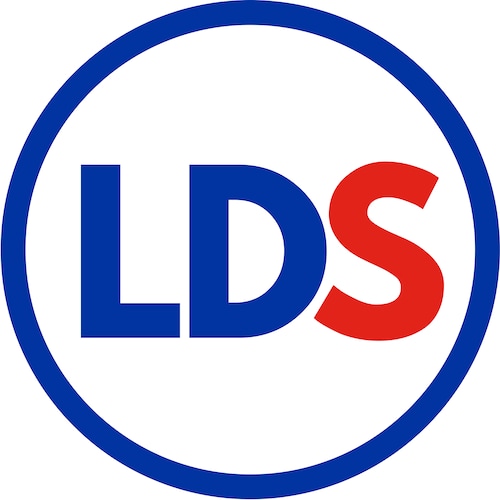For decades, Latter-day Saints have been such a reliably Republican voting bloc that some members — and outsiders — viewed The Church of Jesus Christ of Latter-day Saints as practically synonymous with the GOP.
That is slowly — and, in some cases, dramatically — changing, especially among the faith’s millennial and Generation Z members.
In the 2020 presidential election, more than 50% of these young Latter-day Saints voted for Democrat Joe Biden, reported Brigham Young University sociologist Jacob Rugh.
Among all Latter-day Saint voters, 1 in 3 cast ballots for Biden, Rugh said, whose ticket scored better in Utah than any Democratic presidential candidate since 1964.
Such statistics have galvanized the tiny but growing movement of Latter-day Saint Democrats, including those who are joining the drive to elect Vice President Kamala Harris and Minnesota Gov. Tim Walz in 2024.
On Tuesday, Rob Taber, national director of the newly formed Latter-day Saints for Harris-Walz, staged a virtual gathering of fellow Democrats, featuring prominent party members from across the country.

(Rob Taber) Logo for Latter-day Saints for Harris-Walz.
Some 2,500 people registered, Taber said, and about 1,400 from 49 states participated, including members of all parties and none.
“The level of enthusiasm is unlike what I’ve seen before,” he said in an interview. “Our best-attended events four years ago (also on Zoom) topped out at about 400 attendees.”
It didn’t produce a lot of cash for the Democratic candidates, Taber said. “It was more about building community and raising morale, though morale was already pretty high.”
‘We are all enlisted’
(Rob Taber) Rob Taber, national director of Latter-day Saints for Harris-Walz, says the group is growing and primed to help the Democrats keep the White House.
Like most Latter-day Saint gatherings, the online meeting began and ended with prayers — for the country, for peace and for finding common ground.
Familiar Latter-day Saint phrases — “put your shoulder to the wheel,” “be anxiously engaged in a good cause,” and “we are all enlisted” — were sprinkled throughout a dozen presentations during the hourlong meeting.
“You can’t really be a Democrat in Utah unless you’re a wild-eyed optimist like me,” former Congressman Ben McAdams, D-Utah, quipped in his opening remarks.
Much of former President Donald Trump’s campaign was “all negative,” McAdams said. “Negativity and divisiveness is not of God.”
America is “on the road to our best days ahead,” he exhorted those on the call. “We’ll add our voices to this movement to heal our divided country, to move America forward with liberty and justice for all.”
In the end, McAdams, also a former Salt Lake County mayor, said, “optimism will prevail.”
(Francisco Kjolseth | The Salt Lake Tribune) Former U.S. Rep. Ben McAdams, D-Utah, speaking in 2023, says the “negativity and divisiveness" of former President Donald Trump's campaign "is not of God.”
Mayor John Giles of Mesa, Arizona, is leading a group there called, “Republicans for Harris-Walz.”
Giles, a BYU graduate, reminded the audience about the First Presidency statement a year ago, warning members against straight-ticket voting, and urging them to be active in elections and to examine the character of the candidates.
“I sincerely hope that we get that admonition this election season,” Giles said, “because that would help our brothers and sisters to look with fresh eyes at this election.”
Latter-day Saints love America’s founding document, the Mesa mayor said, but Trump was “more than willing to compromise the rule of law and the United States Constitution to further his own gains.”
Giles lives in an Arizona county with a large Latter-day Saint population that “turned blue” in the 2020 election and, he believes, will do so again.
(Christopher Smith | The New York Times) Mayor John Giles of Mesa, Arizona., shown at the U.S. Conference of Mayors in Kansas City, Mo., on June 20, 2024, reminds Latter-day Saints to examine the character of political candidates.
Utah Rep. Brian King, D-Salt Lake City, who is running for governor, said his faith matches his party.
The party is “progressive in a way that aligns beautifully for me,” King said, with the “plan of salvation and the teachings of our faith.”
‘Hopeful and energetic’
All the speakers “were hopeful and energetic, often speaking to shared values and a dedication to decorum and tradition,” Latter-day Saint historian Benjamin Park reported. “I briefly spoke on the political diversity of the LDS past, and how it was time to amplify and replicate our tradition’s voices for solutions that are both compassionate and progressive. Latter-day Saints should embrace diversity and support the marginalized.”
Park, author of “American Zion: A New History of Mormonism,” reminded participants that Latter-day Saints “were, after all, once the targets of Christian nationalism. Supporting the Harris-Walz ticket would not be a betrayal of our heritage, but rather a fulfillment of it.”
Kristine Haglund also drew on Mormon history to discuss the church and politics.
“In Missouri and Illinois, Latter-day Saints had voted as a bloc, with disastrous results,” said Haglund, former editor of Dialogue: A Journal of Mormon Thought. “By 1891, contemplating Utah statehood, the [church’s] First Presidency wrote that ‘the more evenly balanced the parties become the safer it will be for us in the security of our liberties; and our influence for good will be far greater than it possibly could be with either party overwhelmingly in the majority.’”
This is “wisdom we need to learn anew as the church grows, and grows up,” Haglund said. “Latter-day Saints’ influence for good is greater when we are known as a politically diverse people, a people whose vision of Zion is bigger than a political platform.”
Changing the narrative
(Rachel Rydalch | The Salt Lake Tribune) BYU sociology professor Jacob Rugh, shown in 2022, says Latter-day Saint Democrats could help swing a key Western state or two in the 2024 election.
Based on his research, Rugh, the BYU sociologist, believes regions with big Latter-day Saint populations could move the needle toward Harris-Walz in Western states like Arizona and Idaho.
And, in a race with a small margin between candidates, he said, those voters could make a big difference.
In the 2020 election in Arizona, for example, Maricopa County “flipped red to blue,” Rugh reported. “My geospatial analysis shows that areas heavy with LDS chapels in the East Valley were most likely to flip blue … for Biden-Harris.”
Same goes for Ada County, Idaho, which includes Boise.
“In 2024, you can take it to the bank,” he said confidently. “It [Ada County] will also flip red to blue.”
Even four Utah precincts in Latter-day Saint-dominated Provo “went blue in 2020,” the sociologist said. “January 6 was a breaking point for LDS voters in 2022 [midterm contests]. Election deniers paid a big penalty in Utah, doing about 13 points worse than those who didn’t.”
That shows a lot of Latter-day Saint voters who historically voted Republican didn’t support deniers, including Utah Sen. Mike Lee, who won a third term but by a much tighter margin.
“Utahns are not going back,” Rugh said, “to such overwhelming support for the Republican Party.”
One of the Latter-day Saint volunteers, Joseph Peterson, in Frederick, Maryland, said that the “massive turnout on the call was indicative of both our ability as a small group of organizers to turn on a dime as well as the excitement and momentum for the Harris campaign.”
It could be “another Mormon moment,” Peterson said, “one that more than any other time in the last 100 years will see serious progress in challenging the old and tired rhetoric that stubbornly insists in the impossibility of being a Latter-day Saint and a Democrat.”
That, he said, “never was true.”









